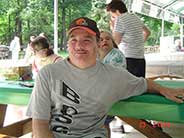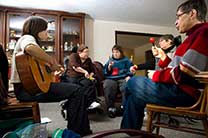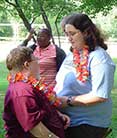Parents have successfully given independence to their children with intellectual disabilities by making plans early and making independence a guiding principle. They speak openly about independence, so their children always expect to live in their own home some day.
Even when these parents have planned for and contributed to a home for their children, they report that the preparations started well before looking for the perfect house.
The most important preparation was helping their children create an independent lifestyle.
Developing an Independent Lifestyle
How do people develop independence? How is this process different for people with intellectual or developmental disabilities?
| Without Intellectual or Developmental Disabilities | With Intellectual or Developmental Disabilities |
|---|---|
|
|
You and your family can help prepare your child with disabilities for future independence, no matter his or her age. Get involved in the community, practice decision-making, and build a support network to help your child transition toward independence.
Connecting With the Community
For individuals with intellectual and developmental disabilities, the focus on community participation has evolved gradually through the advocacy of parents and others with disabilities.
Two things happen when your child participates in the community and interacts with others outside of his or her own family or support team:
- Independence increases and the need for structured supports decreases
- Friendships and other natural supports develop. These tend to be more dependable and longer lasting than paid support staff.
Gaining Community Experience
If your child was mainstreamed in school he or she may have had more opportunity to make community connections and may have had enough experience in the community to feel comfortable. But if your child is an older adult, then he or she may not have had the same opportunities.
If your child needs more experience in the community, make it a goal for his or her transition plan at school, vocational training, or other support services that he or she receives.
The service coordinator, teacher, or vocational counselor may be able to help you access resources or support to increase community experiences while your child is still living at home.
It’s not enough for individuals with disabilities to be limited to interacting with just the people they live with or staff who support them.Learning to Make Decisions
Support staff are trained to let individuals with intellectual disabilities make decisions for themselves. This is a guiding principle for service delivery in the DD system and is mandated by law. Despite this, many parents expect to have a continuing influence on the decisions their children make as adults. They are keenly aware of the vulnerability of their child and the increased risk of disappointment or harm. This is not an unreasonable expectation, but it does create conflict.
There are two things that you can do to minimize this conflict:
- Make certain that support providers and their staff understand your expectations concerning your involvement in decisions.
- Help your child learn to make as many decisions as possible on his or her own.
The National Center on Secondary Education and Transition suggests you help your child prepare for adulthood by asking yourself:
- Do I try too hard to sway my child’s decisions?
- Do I tend to speak for my children instead of letting them speak for themselves?
- Can I separate my own desires from my child’s wishes?
Understandably, it’s hard to let go of your parental role of protecting your child’s safety and happiness. However, an integral part of learning to make good decisions is enduring the consequences of bad ones, and stepping back while a child endures some disappointment or embarrassment will contribute to his or her learning.
Benefits to Helping Your Child Make Independent Decisions:
- Building competence and self-confidence. Making decisions develops a confident approach to new experiences.
- Decreasing vulnerability. People with intellectual disabilities can be easily victimized because they often believe that other adults always know best and should be obeyed. Making independent decisions, helps avoid this.
Improving relationships with providers. Support providers often expect adults with intellectual disabilities to make decisions on their own. Making decisions can help avoid confusion and conflict with providers.













